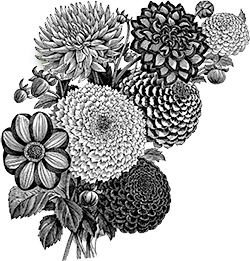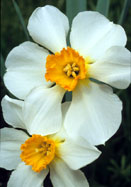Here you’ll find our VERY rarest bulbs along with late finds and others we simply couldn’t squeeze into our print catalog.
Those marked “Web-Only & Rarest” are sometimes in such short supply that they sell out within days — and some years we can’t offer them at all — so if you see one you like, we recommend you order it now!
|
|
|
|
|
|
|
With propeller-like petals and a frilled cup dipped in orange, this late Victorian treasure outshines its sibling ‘Seagull’ and was proudly described by the immortal Rev. Engleheart as “one of my finest and most brilliantly colored” creations. 3 W-YYO, late-mid, 18-20”, zones 4a-8a(10bWC), from Holland. Chart and care.
|
|
|
|
Delicate looking but strong-growing, this graceful flower – long known as ‘Barrii Conspicuus’ – was one of the landmark achievements of the Victorian daffodil renaissance. A clump in bloom, with its fluttering petals and crinkled, orange-rimmed cup, may well remind you of a host of antique butterflies. Learn more. 3 Y-YYO, 14-16”, zones 4a-7b(10bWC), from Holland. Chart and care.
|
|
|
|
The rich color and flair of ‘Dick Wellband’ caused a sensation when it was first introduced – in a lavish display in front of yards and yards of draped black velvet – at the 1921 New York International Flower Show. Today it’s still as striking, growing strong across the country and especially well-loved in the South. 2 W-O, 16-20”, zones 5b-8a(10bWC), from Holland. Chart and care.
|
|
|
|
With a fiery heart and long, creamy-white petals, ‘Firebrand’ lights up the spring garden like a shooting star. “Remarkable for the brilliant coloring of the prettily fluted cup,” wrote A.M. Kirby in 1907, and though the benchmarks for brilliance have changed since then, it’s still a graceful and remarkably beautiful flower. 3 WWY-R, 18-20”, early-mid, zones 4a-7b(9bWC), from Holland. Chart and care.
|
|
|
|
“If I could have but one,” wrote A.M. Kirby in 1907 in America’s first book about daffodils, “I would choose this.” It’s a favorite of ours, too, a glorious Victorian trumpet full of wildflower vigor and grace. It’s extra early, blooming as the crocus fade, and multiplies with gusto. 1 Y-Y, 14-15”, zones 4a-7b(9bWC), from Holland. Chart and care.
|
|
|
|
Named for the Roman poet who celebrated country life and carpe diem, ‘Horace’ was once so popular that daffodil breeder P.D. Williams ranked it with the great ‘King Alfred’ as one of the two “outstanding successes” of its era. It’s another enduring gift to gardeners from the immortal George Engleheart, and truly a landmark daffodil. 9 W-GOR, 18-20”, zones 4a-7a(9bWC), from Holland. Chart and care.
|
|
|
|
‘Insulinde’ somehow manages to be both graceful and exuberant at the same time. Framed by a row or two of creamy white outer petals, its center is a throng of luminous orange petalets spiked with random flares of cream. Bred by the illustrious Mrs. Backhouse (of daffodil and lily fame), it’s named for a wildly popular Victorian novel set in Indonesia. 4 W-O, 21-23”, zones 5a-7b(9bWC), from Holland. Chart and care.
|
|
|
|
True stock! You may think you’ve grown this landmark daffodil, but since the 1950s most bulbs sold in the US as ‘King Alfred’ have been newer, over-sized impostors that were easier to mass-produce in the mild, moist Dutch climate. The real ‘King’ is actually so rare today that we can’t offer it every year, but we have a small supply this fall from Holland’s greatest daffodil collector — and it’s gold, bold, and everything a world famous icon should be. 1 Y-Y, 21-23", zones 4a-7b(9bWC), from Holland. Chart and care.
|
|
|
|
Cute name, very cute flower. From the wild N. cyclamineus, it’s a bright yellow pixie with a long, fluted, “stove-pipe” trumpet and petals that sweep back as if it were riding a broomstick. Vigorous, early-blooming, and a terrific perennializer, it has inexplicably all but disappeared from US catalogs. 6Y-Y, 10-12 inches, early-mid season, zones 6a-8b(10bWC), from Holland. Chart and care.
|
|
|
|
We’re big fans of this vibrant Victorian that was born in Ireland and named for the Archangel himself. Look with your imagination and you’ll see a reflection of heavenly wings in its long white petals, and a hint of what’s to come in its fiery cup. 2 W-YOO, 16-18”, zones 5a-7b(9bWC), from Holland. Chart and care.
|
|
|
|
This Jazz Age classic has long, rippling petals of primrose-to-cream flaring jauntily out of a ruffled center of orange and gold. Hardy north through zone 5, it’s especially well-loved in the South because, unlike many other doubles, it opens reliably even there. 4 Y-O, mid-season, 18-20”, zones 5a-8b(10bWC), from Holland. Chart and care.
|
|
|
|
The brilliant color of this groundbreaking daffodil so dazzled the world when it was first introduced that three bulbs sold for £100 – the equivalent today of over $12,000. Its petals are notoriously unruly, but as William Arnold wrote in 1921, “though a somewhat loosely put together flower, [it] is nevertheless very handsome.” Bred by the illustrious Rev. Engleheart, it’s well named for the youngest of Robin Hood’s Merry Men who is often depicted wearing red silk. 2 W-O, 21-23”, late-mid season, zones 4a-7b(9bWC), from Holland. Chart and care.
|
|
























